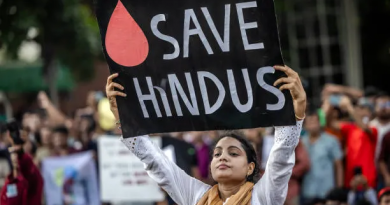OPINION: World watches that New India is not living up to its Image
by Aakar Patel
“After three years of the most disciplined existence in the world…” he paused, “they seek a place with no discipline at all.” We both laughed, because it is true.
Happenings in America expose a fundamental hypocrisy about this new India of ours. We want to screw over our minorities but also want to retain our image as tolerant and peaceful.
This is not going to be possible unfortunately, given the transparency and viciousness with which we are going about our atrocities. With the entire Indian polity from government to judiciary playing along, it is only natural that the world will observe and object.
India’s response after the shellacking we received in the US Congress on the issues of Assam and Kashmir was predictably defensive and petty.
In pushing back against the accusation that we were manhandling our own people, the foreign ministry moaned about cross border terrorism and whined about Pakistan not getting criticised sufficiently. And then we strut about the world pretending to be a great power.
It was excruciating to watch the studied clarity with which the American legislators arrived at an understanding of what India was doing to Muslims in Assam.
The national register of citizens (NRC) was aimed at identifying who was not Indian? Correct. The absolute requirement was a full set of documents? Correct. The burden of proof for this was on the individual and not the state? Correct. Those who were suspected to be without them were locked up by India in concentration camps? Correct. There was a law that specifically excluded all but Muslims from these jails? Correct. Was it a “crackpot” idea or a serious legislation? It was a serious legislation.
Even the bureaucrats of the Trump administration, wheeled out to defend India against this reckless slander from the liberals, found it impossible to. This is how the Citizenship Amendment Bill — which excludes only South Asia’s Muslims from getting Indian citizenship while offering it by default to Hindus, Sikhs and others — was discussed in a report. The co-chair of the India caucus (India’s friend) Brad Sherman commented that “human rights abuse doesn’t cease to be human rights abuse just because it is consistent with law”.
He then sought a clarification whether there was a Bill in the Indian Parliament that seeks to discriminate against Muslims on the issue of citizenship.
Assistant secretary Robert Destro acknowledged that the Bill gave a presumption of citizenship to all religious groups but leaves Muslims out.
“Is this a serious legislative proposal or just a crackpot idea going nowhere?” an astonished Sherman asked. Destro said that it was indeed “a serious legislative proposal”, but “thankfully, it is not going through the Upper House”.
Sherman demanded to know whether the US had condemned the concept of defining someone’s legal rights obligations based on their religion. To this Destro replied that “we are doing it right here. This is a good opportunity to do it.”
Destro commented that most religious groups are not discriminated against, but there was pressure to make special rules for Muslims for which US administration was “calling them out”.
“India’s Constitution provides for secularism and we want the same to continue,” he added. And there were other equally damaging revelations about what we were doing to Kashmiris.
Our response to this, to repeat, was to ask America why it wasn’t saying bad things about Pakistan as well.
To return to where we started, India has been seen in the modern age as a loveable and weird place, which means to do well but is not competent. I will illustrate this with a story from about 20 years ago when Shimon Peres was prime minister of Israel. Now Israel has the draft under which all citizens (except Muslims) are conscripted at the age of 18 and have to serve three years in the military. On coming out of conscription, about 85% of them come to India. Many of these young women and men become deeply familiar with our country, even more than some of us are. Anyway, I asked Peres why he thought they came here and not Europe or elsewhere. He thought about it and said: “After three years of the most disciplined existence in the world…” he paused, “they seek a place with no discipline at all.” We both laughed, because it is true.
Peres was very warm to India, observing that our kindness showed in the way we were the only nation on earth to have stray canines in urban areas. We do not observe such things of course but to him this was high civilisation.
This image of an India that may not be efficient but means well is what we have endangered, though not fully ended, with our actions in Assam and Kashmir and elsewhere. It should be repeated here that Sherman and others on that panel were on the Indian caucus, meaning they are our friends. Even our friends stand astonished and disappointed by the cruelty with which we are building this new India. And all of us are complicit in allowing this to happen.
Article first published on Times of India.
Aakar Patel is a writer and columnist based in Bangalore. He translated the writings of India’s prime minister Narendra Modi from Gujarati. He is a former newspaper editor and has worked at publications across India.
Disclaimer: Views expressed by writers in this section are their own and do not reflect Milli Chronicle’s point-of-view.



